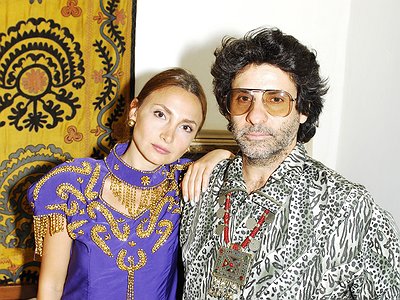Part 1
Name: Zeid Hamdan
Nationality: Lebanese
Occupation: music producer
Current Release: Bedouin Burger on Pop Arabia
Recommendations: The River Tune by Bassekou Kouyate /Sidharta by Herman Hesse / The Sculptures of Ousmane Sow or Pierre Soulage
If you enjoyed this interview with Zeid Hamdan, read more about Bedouin Burger on Pop Arabia and Facebook
When did you start writing/producing/playing music and what or who were your early passions and influences? What was it about music and/or sound that drew you to it?
I started writing music when I was 12. I had taught myself to play guitar but was so bad that I had to invent things and improvise so that I could play properly. At that time I loved the Beatles, The Doors, David Bowie and French Rap like Iam, Ntm and the Norwegian band AHA .
Getting into this field was not about music. It was mostly about being admired and entering the life of people with music and lyrics. I loved the idea of being admired, and I was very uncomfortable with my physical appearance at the time.
Some people experience intense emotion when listening to music, others see colors or shapes. What is your own listening experience like and how does it influence your approach to music?
Listening to music has always been a way for me to experience journeys. I realize that I never sit and listen to music just for the sake of appreciating it. It has to be coupled with an activity and a motion. It has to become the soundtrack to a journey. I am a little bit over-active by nature, and rarely sit and listen except when I have to, like when I'm in a car, on a train or on a plane. This trait has certainly impacted my music because as a result, I “cook” my music during long hours of studio work, then go out and play it in my headphones and live with it and experience how it suits the environment I'm evolving based on the mood I am in. I have to be moved and want to play it again and again.
How would you describe your development as an artist in terms of interests and challenges, searching for a personal voice, as well as breakthroughs?
To be completely honest, I'm a lazy musician. I am mostly driven by human relations when I jump into a project. If I have to look at my career for the last 20 years, it has mostly been about intense and productive friendships. I appreciate that I am still like this today. If I meet people I love and want to spend time with them, I’ll propose a collaboration with them. The result doesn't really matter for me. I just need to spend good time with people I admire and fortunately, the musicians I have produced music with and for, have become and remain close friends until today which allows me to continue to evolve with them musically no matter where we are.
Tell me a bit about your sense of identity and how it influences both your preferences as a listener and your creativity as an artist, please.
I really never think about my own identity. I produce very instinctively and appreciate any style. I really despise labels in the music industry as I find them really limiting. I can't seem to digest the ideas of passports and frontiers either. I see identities more like grooves and spices. I really love when you hear new ways to pronounce words, to count a beat, to dance to a groove. But when you label music with labels such as “African” or “ Middle eastern” or “electro-world “ you’re imposing restrictions. I suffered a lot with the labels that were put on my sounds. I think I lost a lot of opportunities from people labelling my work as “world” music.
What, would you say, are the key ideas behind your approach to music and art?
To have a sincere way of producing without worrying about the format or the style. To never have to consider the market as a benchmark or driver for doing things. And never force things. Music has to remain a pleasure, never a job.
How would you describe your views on topics like originality and innovation versus perfection and timelessness in music? Are you interested in a “music of the future” or “continuing a tradition”?
As long as there is a connection when you are listening to a piece then it suits its purpose. Good music is music that you connect to and that you want to come back to because it affects you, whether we’re talking about “classical” or “innovative” music.
Over the course of your development, what have been your most important instruments and tools - and what are the most promising strategies for working with them?
Chronologically guitar for sure, then drum machine, then sampler, then bass guitar. Following that there’s analogue synths, the guitalele ( mini guitar) and buzuk, followed by Arabic synths (the one that you can micro tune). I also got into loopers. Every instrument affected me in an obsessive way and had infectious effects on my music. I am grateful to all the friends who initiated me to the instruments they loved and mastered. It made the collaborations so elevating. Learning a new technique and instruments are like learning new languages; extremely beneficial and pleasurable.





